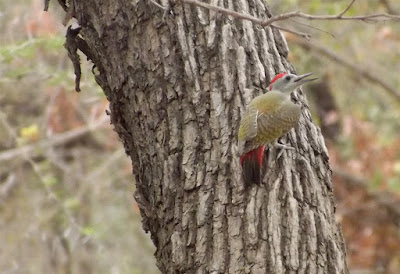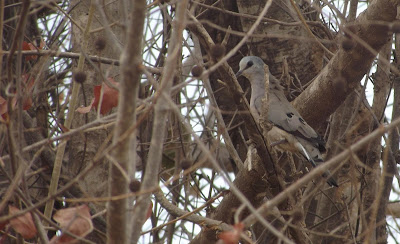We knew we had time for another stop and we noticed that weather had clouded over. Presumably it does this every afternoon in the deepest south of Mauritania ahead of the rainy season.
The first bit of good news is that we sighted a Beaudouin's snake eagle on an electricity pylon, 10 kilometres out of Gouraye. It was instantly recognisable, like a short-toed snake eagle but with a dark brown wash on all parts.
A few kilometres later we arrived at a bridge over an apparently dry river bed. However the woodland next to it looked particularly thick.
This proved to be a very good choice of place to stop.
Gosling's bunting
A much biggest nest was seen once we got into the woodland. It was a hamerkop's nest.
hamerkop's nest
We soon came across some hamerkop. However a bigger discovery was that there was water in places along the stream's bed. This made the woodland much more interesting.
four hamerkop
The small passerines: red-cheeked cordonbleu, red-billed firefinch, black-headed weaver, red-billed quelea were scattered around the wood but were most easily seen drinking.
red-cheeked cordonbleu and black-headed weaver drinking (courtesy of Mohamed Vall)
red-billed firefinch
Near the water were a small number of western plantain-eater. This was yet another addition to my country list. It is a bird usually assocaited with Savannah which gives you an indication as to how dense and wet this piece of woodland was.
western plantain eater
Yellow-crowned gonolek is another bird only found in the south of the country but not as selectively as the plantain-eaters.
yellow-crowned gonolek
There was a second edition to my list here too. It was brown babbler. Unfortunately the group evaded my camera though Mohamed Vall got a record shot.
hoopoe
Resident African hoopoe were observed. This is ideal terrain for them.
African grey woodpecker (courtesy of Mohamed Vall)
A pair of African grey woodpecker were not easily scared by us. We had expected to see this species here when we surveyed the woodland before we went inside it. However, what we are beginning to question is why neither of us has seen any other type of woodpecker in the country.
Black-billed wood dove (courtesy of Mohamed Vall)
Another expected bird was black-billed wood dove. Indeed it looks better habitat (wettest and denser) than where we had seen them for the first time near Gouraye.
black bush robin
Of course more common birds of woodland were present such as black bush robin and namaqua dove.
We arrived back in Selibaby in the evening well satisfied.
Species seen at the woodland
Hamerkop 6
Grey Heron 1
African Collared Dove 3
Laughing Dove 11
Black-billed Wood-Dove 4
Namaqua Dove 8
Western Plantain-eater 6
Eurasian Hoopoe (African) 4
Western Red-billed Hornbill 5
Abyssinian Roller 3
African Grey Woodpecker 2
Common Kestrel 1
Ring-necked Parakeet 4
Yellow-crowned Gonolek 5
Common Bulbul 2
Willow Warbler 2
Brown Babbler 4
Long-tailed Glossy Starling 8
Gosling's Bunting 10
Northern Grey-headed Sparrow 6
Black-headed Weaver 4
Red-billed Quelea 75
Red-cheeked Cordonbleu 11
Red-billed Firefinch 8












What kind of bird is that Plantain-eater? Some kind of cuckoo?
ReplyDeleteIt's a kind of turaco. Rob
ReplyDelete